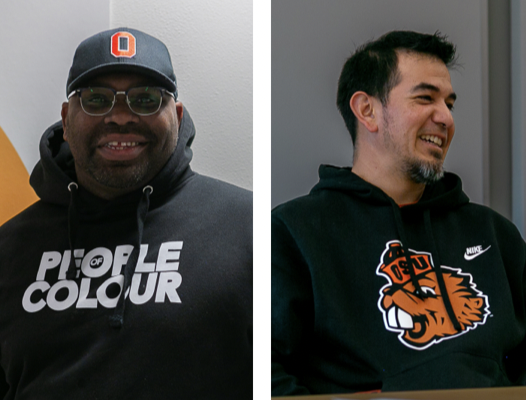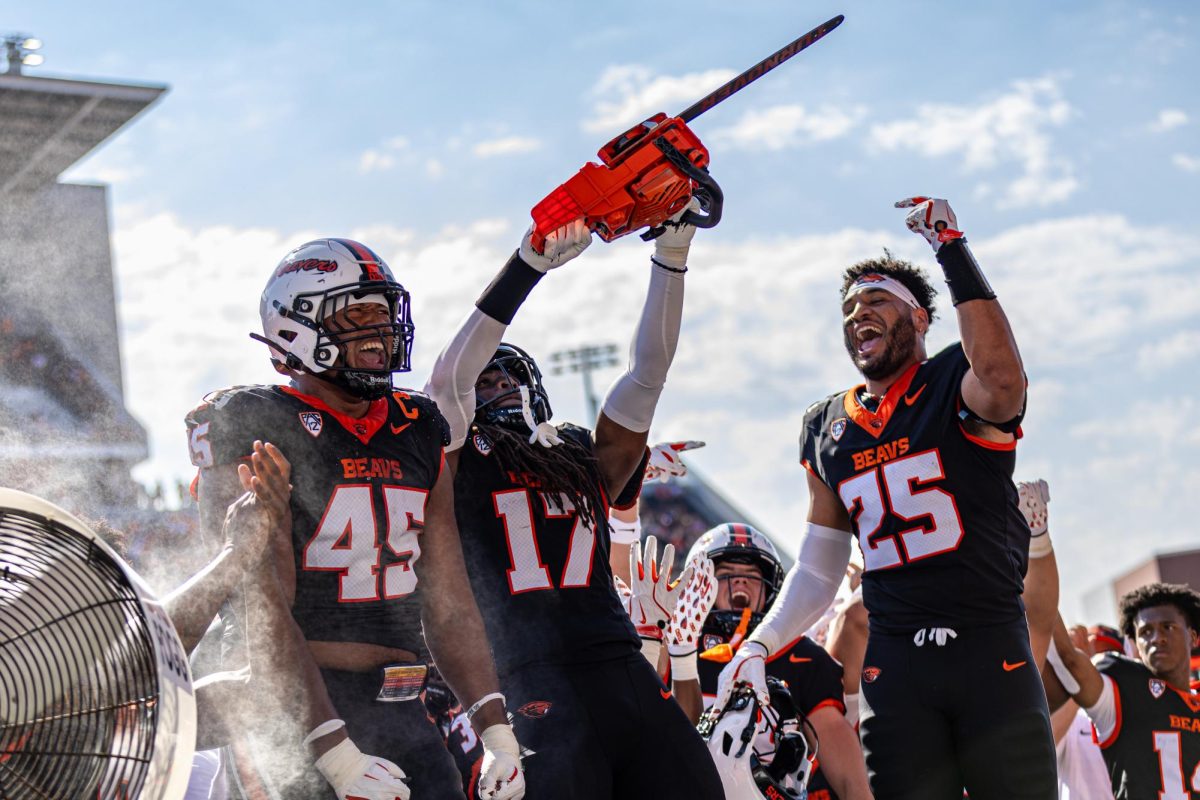As the sun sets over Oregon State University’s Reser Stadium and the cheers of enthusiastic fans echo through the brisk November air, the past comes home to former OSU football players. They gather to reflect on a tradition that has left an indelible mark on their lives.
For these former gridiron warriors, the “Civil War” is not just a game; it is a piece of their history. With the season’s end approaching and the potential final clash against the University of Oregon on the horizon, these players share what this enduring rivalry truly means to them.
Alexis Serna, who played from 2004 – 2007 as a punter and kicker reflected on why he came to OSU. Saying that coming from southern California, the culture of college football was like nothing he had experienced until Serna arrived at OSU.
Serna joined the school’s athletic staff in 2018 as the director at Beyond Football.
A program part of OSU’s football department to help students learn professional skills. The program aims to help give the student-athletes, an “Experience that aims to provide opportunities and a platform for the personal and professional development of our student-athletes.”
Serna’s deep appreciation for OSU’s football program birthed his allegiance to the program and has allowed Serna to grow in his career.
He said, “It’s a passion and drive learning about that (OSU rivalry with UO) and taking a lot of pride in that.” Serna continued, “I bleed black and orange.”
James Rodgers, who played from 2007 – 2011, spoke about what being a part of the OSU team meant to him, and how it helped shape his perception of himself.
He said, “Building relationships with new people and developing a family bond with some of my teammates was a part of it.”
Rodgers went on to play in the NFL on the Atlanta Falcons roster for two years and then with Montreal in the CFL for two seasons.
While at OSU, Rodgers played three bowl games and led the team to the 2007 double-overtime victory against UO.
Dorian Smith, who played from 2006 – 2008, spoke about how his path to becoming a Beaver was a little different. He transferred to OSU, and it changed him in ways he did not expect.
Smith said, “I came from being a junior college player when your whole goal, of course, is to win, but second to that is to move on.”
Smith continued, “So you are more individualistic in that aspect. I wanted to change personally from being focused on myself and getting to the next level to doing whatever I could to help the team win.”
Back in 1894, the Pacific Northwest was not known for its sportsmanship, let alone football rivalry because the game of American football as we know it today was not established yet.
The version of football being played at that time was referred to as “gridiron football” because the fields at that time resembled a gridiron.
How did a game that people were unfamiliar with come to gain so much popularity that it led to a legacy of rivalry that is now over 100 years old and known as one of the biggest in the PAC-12 conference?
By adapting American football from sports like rugby and soccer. This allowed significant change in how the sport was played back then and what it would come to be.
Student leaders from Yale, Harvard, Princeton, and Columbia established standardized rules for American football. These institutions were among the early proponents of the sport. This would go on to be called the “Massasoit Conventions”.
This brings us to a rivalry that is now over 100 years old in the state of Oregon. To emphasize that tension the rivalry was given its controversial name of the “Civil War.” The origins of the name came from Oregon head coach John McEwan (1926-1929).
Though the name was denounced in 2020 by OSU’s then-president Ed Ray, it’s a name that has followed a tradition and tense-filled game of over 100 years and remains a topic of conversation when the game approaches.
However, attending football games is one experience, but being a part of the OSU team and playing in the games is an experience all on its own.
Serna, Rodgers, and Smith went on to describe different interactions with Duck fans while at their home in Autzen stadium.
Duck fans would boo and be confrontational to others and yell from the stands. Bringing in the full view of the pressure that comes with this game.
When asked what the Civil War means on a personal level, Serna said, “Obviously you want to win every single game but that one specifically, it is for the state of Oregon, who is the best team in the state. That is a big deal.”
Rodgers said about the rivalry, “It means a lot because when you think about it Oregon and Oregon State are like the NFL teams that the state of Oregon has had outside of Seattle.”
Rodgers said, “It is the entire state that gets behind the team that wins. (The losing team) must wait a full year to be able to play each other again and try to win. It is bragging rights for a full year until they play again.”
When asked Smith said, “Winning means everything. The only game that mattered was Oregon.”
“I think that because the schools are so close and we are tied together, and it has been happening for a long time, and there are so many small communities within the state. This holds so much more power.” Smith said.
The highlighted experiences while playing for OSU emphasize the never-ending tension that pushes forward today between OSU and UO.
After OSU’s victory last year, the morale on campus feels optimistic. Come Friday, November 24, the game will be played at UO’s Autzen Stadium in Eugene.
Who will take this victory? Who will earn the right to call themselves the best in the state for the next year?
All of this because a crowd-less scrimmage game played back in the autumn of 1894 between two schools would become the biggest rivalry in the state of Oregon.











































































































